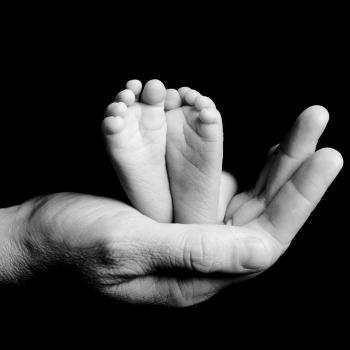
If you saw a woman walking into a crisis pregnancy center, what would your first thought be?
She is pregnant and in crisis. That much you can safely assume. Beyond that, you could speculate: A single mom, most likely. She looks quite young, so probably an unwed mom. Maybe she’s considered an abortion and been steered towards better options. Maybe it’s her first. Maybe it’s her second.
Then you do a double take. That’s when you realize it: That’s not a single mom. That’s a woman you know.
That’s a woman you know, and she’s married.
That’s a woman you know, and she has small children.
That’s a woman you know, and she goes to your church.
Christian. Married. Pregnant. In crisis.
“But how can that be?” you ask. She has a loving husband with a steady job that’s providing for their needs (isn’t it?) And anyway, husbands and wives make plans about this sort of thing (don’t they?) Besides, they have a church community around them, so they should be taken care of (are they?)
These are hard, uncomfortable questions. But as Christians, we need to ask them, and we need to be prepared for the answers.
Here’s a google search for you to try: “baby shower” “second child.” On the first page, you’ll turn up forum discussions about whether it’s rude to suggest a second baby shower. By the time you’re on baby #2, certain unspoken assumptions are in place about where you’re at—or rather, where you should be at. You should be financially fairly stable, at least stable enough to have a second child (otherwise how did that happen?) You should have hand-me-down clothes and baby things aplenty (assuming baby #2 has the same gender as baby #1, of course). So why throw a second shower? It’s overkill. It’s redundant. It’s just not the done thing. By baby #2, you’re on your own. You’ll be fine.
Earlier this year, I read a blog post that deeply disturbed me. But it also opened my eyes. It was called “A pro-life response to unexpected pregnancy.” The author of the piece, Brittany Meng, is a Christian military wife and mother of five. She’s written and worked hard for the pro-life cause and upholds the sanctity of life. She cares for two sons on the autism spectrum. She’s a miscarriage survivor. She is the last kind of mother for whom you would imagine the thought of abortion would cross her mind, even fleetingly.
And yet it did.
Her fifth child was a surprise. Further, the pregnancy brought intense morning sickness of a kind she’d experienced before and prayed fervently never to experience again. But this prayer was unanswered. She writes graphically about the debilitating, wrenching nausea that left her bed-ridden, except when she staggered to the bathroom for one of many vomiting sessions. At the same time, she was sinking into a black pit of anxiety and depression.
“Is this a wanted pregnancy?” a questionnaire asked. She writes that she checked “yes,” because she knew the unspoken question behind the question. She knew what the done thing is with “unwanted” pregnancies. With her pen, she said “yes.” But in a corner of her mind, a corner of her heart, something else whispered “No.”
Out of curiosity, she began googling “morning sickness” and “termination,” and the results she found broke her heart. To her growing horror, as she read the stories, she understood them all too well.
She never made an appointment. She never whispered the thought to anyone but her therapist while she was thinking it. But eventually, she chose to share her “desperate, damning truth” with the world—not because she had changed her mind about abortion, not because she was proud of what she had thought even fleetingly about doing, but because people need to understand. They need to understand that while some of their friends are celebrating their pregnancy as an unmixed blessing, others are struggling to count it all joy. And often, very often, they struggle in silence—through shame, through fear, through embarrassment.
This is where it is imperative that the church proactively step up to the plate. I cannot underline this advice from Meng enough:
If you know someone who is unexpectedly pregnant, say congratulations but don’t just shower her with your excitement—ask how she is feeling about the pregnancy.
Keep asking.
Check in on her.
Pray for her and tell her you are praying for her.
Check in on her again. And again.
It is one of the profound, unfathomable mysteries of life that sometimes our greatest joys are inextricably linked with our greatest suffering. When Mary said “Yes,” she said “Yes” to joy and pain together, for she said “Yes” to life. If we, the church, are unwilling to confront this, to grapple with this beautiful and terrifying thing, we have reduced “Count it all joy” to a cheap needlepoint platitude.
As Christians, we must declare that life is better than death, even when death would feel like a mercy. We must declare that it is better to be than not to be. And then we must act like we mean it.
Let me close with one more story. This is the story of a man who fell in love with a beautiful girl. They both loved Jesus passionately. They wanted to serve him together. But her health was not good. Ever since childhood, she’d suffered from the symptoms of Lyme disease. Chronic pain, nausea and fatigue were part of the fabric of her life. But they chose to marry anyway. Then, on her wedding night, she started to get worse.
Then, after that, things got even worse. From tics to seizures to loss of motor capacity, everything that could go terribly wrong, did.
But this isn’t the end of the story. Because it’s not only Sarah who is sick now. It’s her husband, Michael, too. Both of them now manifest the symptoms of Lyme. They live one day at a time, hoping for the day when Michael is strong enough to finish his education and seek gainful employment.
Michael and Sarah would join a new church if they could, but they’re so debilitated that church-shopping is an impossible endeavor. Still, with what they have, they give thanks. They pray together. They meditate on Scripture together. They read writers like C. S. Lewis to keep their minds sharp and deepen their walk with God. They write about faith and the Christian walk (Sarah’s blog, Inkblots of Hope, is maintained here, where you can read her story in her own words). In all things, impossibly, they have given thanks.
And they give thanks now. Because God has brought them something else unforeseen. He has brought them a child.
They give thanks, even though OBGYNs left and right are turning Sarah down because she is “high-risk.” They give thanks, even though when they get lists of referrals all the known pro-life doctors they can find are too far away. They give thanks, because life has come, and it is well. Life has come, and it is very good.
A GoFundMe page was set up four months ago for Michael and Sarah, before they found themselves pregnant. They need help now more than ever. Thankfully, Sarah’s symptoms have lessened with the pregnancy, but there is a high probability they will return when the baby is born.
We give to many things and many people. We cannot give to everyone. Maybe you cannot give to Michael and Sarah. But let me ask at least that you pray with me for them. Let me ask that you pray for my friends, even though they are not your friends. Pray, and remember what it means that Christ became incarnate, not as a full-grown man, but as a baby. It means that the mother and child must give us pause. It means that we must see every child as it were the Savior of the world.
It means that God became Emmanuel. It means that He is with us still.













